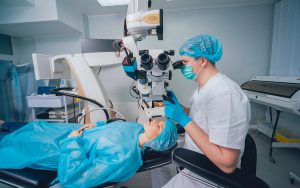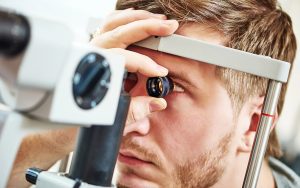
Can Supplement Improve Vision and Eye Health?
Individuals with a family history of impaired eyesight or eye health issues may be concerned that they will develop similar problems at some point in their lives. However, though genetics plays a major role in determining your eye health, studies show that your diet also plays a critical role in preventing eye problems.
Your eyes require a critical mix of vitamins to maintain or improve your vision, especially as you get older. Your eyesight naturally declines as you age. It can be scary for many people as blurred vision slowly progresses.
Trying to discover a solution for improving your eyesight and maintaining healthy eyesight will lead you to supplements and vitamins. So, can vitamins and supplements help your eye health and improve your vision?
Well, the short answer is yes! While many foods help promote eye health, nutritional supplements are good if your diet lacks essential vitamins that your body needs daily.
How Do Good Nutritional Habits Improve Your Eyesight?
Eyestrain and your family history are important factors determining your eye health and vision. However, several studies have shown that specific vitamins and minerals can support eye health and prevent detrimental eye and vision issues.
The best way to naturally enhance your eyesight is to get the necessary nutrients from your dietary habits. A diet rich in eye-enhancing nutrients can guarantee that you get the vitamins and minerals required to maintain and improve vision and eye health.
Consuming high-calorie, low-nutrient meals instead of fruits, vegetables, and other nutrient-rich foods can damage your health, including your eyes. While a balanced, nutrient-rich diet is beneficial to eye health, consuming highly processed and high-fat meals may raise the risk of eye disorders.
Vitamin deficiencies, in particular, can raise the risk of certain eye disorders such as cataracts, glaucoma, and age-related macular degeneration (AMD).
Can Supplements Improve Your Eye Health?
Yes! Some vitamins and supplements may help prevent or delay the progression of eye conditions such as glaucoma, cataracts, and ADM.
Supplements complement any nutrient deficiencies and reduce the risk of developing eye disorders.
Taking a multivitamin and mineral pill regularly will assist in addressing nutritional gaps in a less-than-ideal diet. In addition, it may help prevent you from degenerative illnesses such as AMD and cataracts.
Which Vitamins and Supplements Improve Your Eye Health?
1. Vitamin A
Vitamin A is important for good eyesight because it keeps the cornea, or the outer coating of the eye, clean and clear. When you don’t get enough vitamin A in your diet, it might increase your risk cornea and retina disorders, causing visual problems.
Vitamin A supplements will help increase your eye pigmentation, ensuring better eyesight in low light.
2. B vitamins
Several B vitamins, including B6, B9, and B12, can help improve eye health.
These vitamins can aid in the reduction of homocysteine, which is linked to inflammation. Therefore, this reduces vascular issues that affect the eye retina. As a result, it helps prevent disorders such as age-related macular degeneration (AMD).
Similarly, a deficiency of B vitamins can cause complications with the optic nerve. It might result in declining vision, blurred vision, and blind spots in extreme cases.
3. Vitamin C
Vitamin C is a natural antioxidant. Antioxidants help defend against free radicals, which can cause changes to your body, including the eye’s lens. Studies show that vitamin C may aid in the prevention of cataracts, a disorder that causes your eye to grow clouded and affects vision.
Similarly, recent research suggests that vitamin C helps improve blood vessel health and iron absorption. It can also help reduce the progress of AMD by strengthening the blood vessels in your eye, improving vision.
4. Vitamin E
Vitamin E also functions as an antioxidant in your body, and research suggests that it may protect you against visual loss as you grow older. In addition, vitamin E helps protect your cells from free radical damage. This prevents or delays the onset of AMD and cataracts.
5. Lutein and Zeaxanthin
Lutein and zeaxanthin are members of the carotenoid family, a group of substances that plants produce. They aid in filtering high-energy blue wavelengths of light that can be harmful to the eyes, preventing cataracts and reducing the advancement of AMD.
6. Omega-3 Essential Fatty Acids
Omega-3 fatty acids, often present in fish and fish oil, are associated with improved immune system performance and healthy brain development.
Similarly, omega-3 fatty acids are critical for sustaining good eyesight and visual development. They have anti-inflammatory characteristics and help prevent conditions like AMD and diabetic retinopathy (DR).
Omega-3 fatty acids may also assist in alleviating dry eyes by encouraging the tear glands to make more tears.
7. Zinc
Zinc and zinc supplements can assist your immune system and your eye health.
Zinc aids in the absorption and use of vitamin A. This helps your body produce the protective pigment melanin in your eyes.
However, copper absorption decreases when you take zinc in large quantities. Therefore, studies show that you can use zinc supplements with copper supplements.
8. Riboflavin
Riboflavin (vitamin B2) can aid in minimizing oxidative stress, which can benefit your eyes. According to research, chronic riboflavin shortage may result in cataracts.
When Should You See Your Doctor?
Regardless of the type of nutrition plan you would like to start, your doctor should be your first information resource to help with your eye health,
Remember that vitamins and supplements may not be a sure treatment or substitute for your eye prescription therapy. However, they do complement medication or therapies that your doctor may recommend.
Take Away
Research suggests that your diet plays a crucial role in helping prevent or slow down the progression of several eye conditions.
Though there is a wide variety of supplements in the market, it is important to always consult your doctor about supplements or any interaction with your medication. Also, make sure to read the supplement labels carefully.
However, a nutrition-rich diet will provide the recommended nutrients to promote eye health.
Consult with Anaheim Eye Institute’s ophthalmologists for a proper diagnosis, nutrition and supplements plan to improve your eye health and vision.




